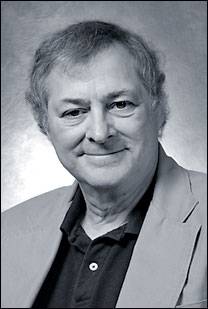Microbiologist Arnold Levine to Speak at Brookhaven Lab on the Evolution of Genes that Prevent Cancer and Preserve Life
Will discuss important roles played by genes that have survived for over a billion years
August 20, 2009
UPTON, NY – Arnold Levine, a leading authority on the molecular basis of cancer and faculty member of the Institute for Advanced Study, discovered a protein known as p53 — now known as the single most common genetic marker for cancer – in 1979. On Monday, September 14, Levine will give a lecture at the U.S. Department of Energy’s Brookhaven National Laboratory on how the genes for p53 and related proteins have survived through a billion years of evolution.
This year marks the 150th anniversary of the publication of Charles Darwin’s book, The Origin of the Species, which explains the diversity of nature through evolution. Levine’s BSA Distinguished Lecture will focus on genetic evolution, or changes in gene frequency from one generation to the next. Titled “From Sea Anemone to Homo sapiens: The Evolution of the p53 Family of Genes,” the talk will be held at 4 p.m. in the Laboratory’s Berkner Hall. BSA Distinguished Lectures are sponsored by Brookhaven Science Associates, the company that manages Brookhaven Lab, to bring topics of general interest before the Laboratory community and the public. The lecture is free and open to the public. Visitors to the Laboratory age 16 and over must bring a photo ID.
Scientists originally thought that p53 accelerated tumor growth, but Levine and his colleagues showed that it suppressed tumors. Levine and colleagues characterized and identified a version of p53 in the fruit fly, an important model organism for the study of a host of human diseases, including cancer. Subsequent research has shown that p53 and related genes have been preserved through many species for a billion years. Even creatures as ancient as the sea anemone have ancestors of these genes.
As Caucasians and Asians evolved from their African ancestors, genetic variations occurred in the p53 gene that produced differing characteristics in individuals of the same population. These variations have dramatic impacts on the age of onset of cancers, the frequency of cancers in the elderly, and the longevity and even the fertility of a population. Levine will explain how and why the family of p53 genes has been so important for tumor suppression and species survival in evolutionary changes occurring over a billion years.
After earning a Ph.D. in microbiology from the University of Pennsylvania in 1966, Levine took a postdoctoral position at the California Institute of Technology. He joined the faculty of Princeton University in 1968, and in 1979 he moved to Stony Brook University’s School of Medicine as chair of the Department of Microbiology. He then became chair of Princeton’s Department of Microbiology in 1984, presiding over a major expansion of Princeton’s life sciences programs. He was president of the Rockefeller University and Rockefeller’s Heilbrunn Professor of Cancer Biology from 1998 to 2002, before joining the Institute of Advanced Study in 2002 as a professor in the School of Natural Sciences at The Simons Center for Systems Biology.
A member of the National Academy of Sciences and the Academy’s Institute of Medicine, Levine has won numerous awards, including the 2001 Albany Medical Center Prize in Medicine and Biomedical Research, the National Cancer Institute’s 2001 Alfred Knudson Award in Cancer Genetics, the 2005 Bristol-Myers Squibb Freedom to Discover Award, the 2008 Kirk A. Landon American Association for Cancer Research Prize for Basic Cancer Research, and the 2009 American Cancer Society Medal of Honor.
2009-11001 | INT/EXT | Newsroom










